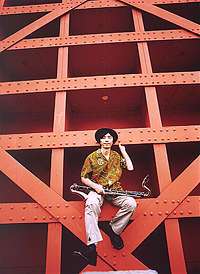Cicala Mvta
The Return of Japanese Street Music
with Wataru Okhuma's CICALA MVTA
 The band Cicala Mvta was founded in 1994 by its leader Wataru Okhuma who is rated as one of the most innovative musicians of contemporary Japanese music. He is a superb player of the clarinet, saxes, vibes and accordeon.
The band Cicala Mvta was founded in 1994 by its leader Wataru Okhuma who is rated as one of the most innovative musicians of contemporary Japanese music. He is a superb player of the clarinet, saxes, vibes and accordeon.
As producer and bandleader Wataru Okhuma had participated in many revolutionary recordings of the 80ties (a.o. "Soulflower Mononoke Summit") .
Wataru Okhuma merges in his music Okinawa-style music and other traditional Japanese forms like Jinta with western composition techniques and traditions.
Some say this CD "Ching Dong" is the Japanese answer to Giora Feidman and to Fanfare Ciocarlia. The bands name, Cicala Mvta is Italian and is written as the epitaph on the gravestone of the greatest street singer songwriter of popular music in Japan before the 1920s,Soeda Azembo, who at the time around 70 years ago, unable to speak his mind in fear of being thrown into prison, like having a cicala stuck in his throat, a "mute cicada".
The band Cicala Mvta merges Japanese Chindon music with own compositions and traditional music from various ethnic regions. Okhuma plays a composition by Paul Dessau as well as Kabuki-melodies (Shi-chome) and Nepalese wedding dances or Klezmer songs.
Basis is Chindon music which until 50 years ago was a popular street form of advertising. Chindon bands were common in Japanese cities where new openings of shops, inaugurations of Pachinko's a.o. were announced by them.
In Cicala Mvta brass bands from Balkan meet Klezmerbands as well as New Orleans Marching Bands within the overcrowded streets of Tokyo.
 The British magazine "FolkRoots" about "Ching Dong":
The British magazine "FolkRoots" about "Ching Dong":
The stirring debut album by Cicala Mvta, Wataru Okhuma's own band, produces complex, challenging and powerful music.
More informations see booklet / written by Paul Fisher
The name of the band derives from the inscription on the tombstone of the japanese artist Soeda Azembo: CICALA-MVTA CHE CANTAVA E LA SVA MOGLIE CHE L' AMAVA (The mute cicada that sang and his wife who loved him).
This is the epitaph for Soeda Azembo (mute cicada) the greatest street singer-song-writer of popular music in Japan, before the 1920's --- thebeginning of the days of mass culture. In those days the street-singers used to sing and sell the songbook on the street. And the incredible point is that before radio broadcast and SP records, his comical and sarcastic songs often became a mega-hit in the whole country! Also he is known to create the first modern protest song in the movement of the early socialists in Japan. His pen-name derives from the ironic humor that the "mute cicada" loudly sang ! But it was not humorous at all, that after the mid1920's, the hard oppression of the militant totalitarism and the development of mass culture industry got him really mute.
What is "JINTA" ?
The first western music formally imported into Japan was brassband-music as a part of military technology, like in many other colonized countries. The military brassbands not only played marching music but also western classics, to demonstrate the western music to the people. At first it was entirely a high-culture.thing. But it didn't take a long time to find it's cheap imitators. Most of those commercial bands were recognized in official to be vulgar or kitsch , but lots of them became be popular in downtown Tokyo. People intimately called those bands "Jinta" , one of the predecessors of chin-don
CD "Deko Boko"
CD "Ching Dong"
.
